Newsletter


Our Newsletter
Connections
Apr
12

Remembering Heroes Too
This month we commemorate Holocaust Memorial Day, to honor the six million Jews, including 1.5 million children, who died in the Holocaust at the hands of Nazis and their collaborators. Naturally it is a very solemn day in Israel and among the international Jewish Community. Here, at the Los Angeles Jewish Home, we have many Holocaust Survivors as residents. As you can imagine, our observance does not feel like a historical reflection, but rather like a real and living recall of an unprecedented horror. Our survivors are amazing, strong, inspiring. On their behalf we promise to never forget.
What many people do not realize is that "Holocaust Memorial Day" is not actually the name of the holiday. And its translation, "Yom Hashoah," is not the name of the holiday in Hebrew. The full name of the holiday is Yom Hazikaron laShoah v'la'Gvurah, which means, "Remembrance Day of the Holocaust and of Heroism."
Notice the difference.
By remembering to add the word, "Heroism," we shift the focus to include something positive. This is not a day when we only remember the 6 million who were taken. We also remember the courageous survivors. In addition, we honor those who struggled against the Nazis, like those who fought to the death during the Warsaw Ghetto uprising. Moreover, we celebrate the many Christian Rescuers and Righteous Gentiles who risked or gave their lives resisting evil and saving Jews.
There are the famous four people who helped to hide Anne Frank's family: Miep Gies, Johannes Kleiman, Victor Kugler and Bep Voskuijl. And thanks to Steven Spielberg, we know about Oskar Schindler's heroic rescue of 1200 Jews. Israel acknowledges the Righteous Among the Nations with trees planted at Yad Vashem, the memorial in Jerusalem.
But we must also remember the many brave and virtuous who were surely anonymous. A farmer here, a neighbor there, that never received credit for resisting evil and rescuing Jews if they themselves were caught or if those they attempted to protect were eventually captured. Indeed Viktor Frankl, the Jewish psychiatrist who survived Auschwitz, acknowledged that even there he observed Nazis who defied orders and tried to help inmates.
Even amid the darkness there are inspirational lights.
What does this mean for us in 2018? Of course we have an obligation to remember the Holocaust. We must also recall the genocide against the Armenian People perpetrated even before the Holocaust. We need to pay attention to world events and not be silent in the face of evil wherever it may happen. "Never again" is a mandate, not an ideal.
A week or so after Yom Hashoah we celebrate Israel's Independence Day, Yom Haatzmaut. Israel turns 70 years old this year! And while the dream of a return to Zion where Jews would be safe and living peacefully with her neighbors in dignity on all sides has not completely come to fruition yet, this old/new State is growing every day and each year. We can be proud of all of Israel's innovations and accomplishments and be grateful that the Jewish People have a homeland again, a place to which we can always return home.
Apr
5
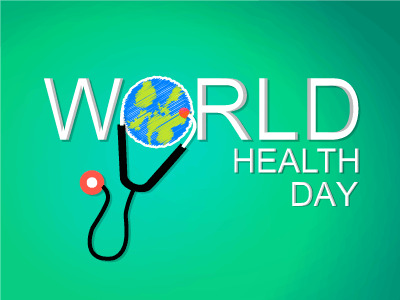
The World Health Day Q & A
Saturday, April 7, is World Health Day. It’s an important day and one with which we should all be familiar.
Here are six things you need to know about World Health Day.
Q. Who is behind World Health Day?
A. The World Health Organization (WHO). WHO was founded in 1948 and is the leading global health authority within the United Nations system. This year marks their 70th anniversary.
Q. Does WHO sponsor a World Health Day every year?
A. Yes. World Health Day is a global health awareness day celebrated every year on April 7. Every year a different and specific health concern is highlighted. In recent years, they included depression, diabetes, and food safety.
Q. What is the theme of this year’s World Health Day?
A. For 2018, the theme of World Health Day is “Universal health coverage: everyone, everywhere.” The slogan is “Health for All.”
Q. Why is universal health coverage the focus of this year’s World Health Day?
A. Following are some interesting statistics concerning universal health coverage:
At least half of the world’s population still doesn’t have full coverage of essential health servicesAbout 100 million people are pushed into “extreme poverty” (living on $1.90 or less a day) because they have to pay for health careOver 800 million people (almost 12% of the world’s population) spend at least 10% of their household budgets on health care
Q. What does universal health coverage provide?
A. Universal health coverage allows people to have access to the health care services they need, without causing them financial hardship. It includes the full spectrum of essential, quality services, from health promotion to prevention, treatment, rehabilitation, and palliative care.
Q. What does universal health coverage not provide?
A. Universal health coverage doesn’t provide free coverage for all possible health treatments regardless of the cost since no country can provide all services free of charge. But its goal is to ensure an expansion of coverage of health services and financial protection as more resources become available.
Now that you’re familiar with the key facts about World Health Day, share them with your family and friends so they will be aware of this important day.
Mar
23
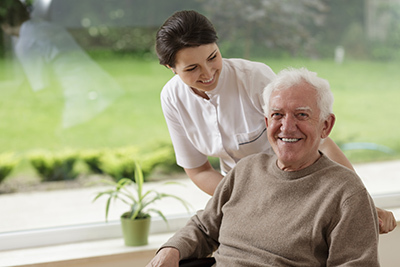
What is Assisted Living and Is It Right for Me?
For people who can get around independently but still require assistance in some of their activities of daily living (ADLs), assisted living may be an excellent choice for seniors.
Facilities that offer assisted living can help in a variety of important ways.
Doing housework and laundry
Housework and laundry are hard work. As we age, they become even more difficult. Assisted living will assume these responsibilities for you.
Preparing meals
Do you find it more and more difficult to make meals on your own at home? Do you sometimes forget altogether? Assisted living can prepare your meals for you.
Arranging transportation
Assisted living facilities can provide transportation services if you no longer drive.
Remembering appointments
As we age, we may become more forgetful. If you are missing appointments or having a hard time remembering where you placed certain items, assisted living will help keep you on track and on time.
Preventing falls
Have you fallen at home? It’s scary and can cause serious problems. Assisted living facilities offer grab bars to help prevent falling. They also provide emergency call systems so if you do fall, you can get help right away.
Dealing with depression or loneliness
You may face issues of depression and loneliness, often because of the loss of a spouse. Assisted living communities give you the chance to live with and meet new people and develop friendships. They also provide organized social and community events.
Every assisted living facility is different, and all offer different levels of assistance. If you are interested in assisted living for yourself or a loved one, please contact the Los Angeles Jewish Home. We provide a full range of assisted living services to enhance the quality of life for seniors.
Mar
19

Our 106 Year Tradition: The Community Seder
This year, Passover, which celebrates the liberation of the Jewish people from the cruel reign of Pharaoh, begins on the evening of Friday, March 30th. Over the first two nights of the holiday, families and friends will gather together to experience a Seder, a re-telling of the Passover story followed by a festive meal.
"The Passover Seder creates an atmosphere which encourages us to put ourselves in the place of those who are oppressed, and then celebrate the Exodus to freedom," says Rabbi Karen Bender, the Jewish Home's Jack H. Skirball Director of Spiritual Life. "Many among us have our own personal Egypt, which in Hebrew means a ‘narrow space.' It could be a medical issue, personal loss, destructive relationship, drug or alcohol addiction…there are hundreds of situations which can afflict us spiritually, physically and emotionally. At Passover, we focus upon our collective story, preparing to take action to liberate others and to free ourselves from bondage."
On the first night of Passover in 1912, five homeless men sought freedom to worship with their brethren, safe from the ethnic taunts they had to endure at the "poor house" where they lived. They were taken in by caring Angelenos who read the Haggadah with them and served them dinner. The occasion marked a turning point in the life of the Los Angeles Jewish community, and those five seniors were the first residents of what would become the Los Angeles Jewish Home. The Community Seder at the Home has been a continuous tradition since that historic night 106 years ago.
Please take this opportunity to join residents and staff of the Jewish Home for a truly heartwarming experience as we celebrate Passover and the freedom it represents.
This year's Community Seder begins at 5 p.m. on Saturday, March 31st at the Jewish Home's Eisenberg Village campus. Tickets are $36 per adult and $18 per child under 12. Advance purchase of tickets is required by March 26th.
Please call (818) 774-3386 or email [email protected] to reserve your place.
On behalf of the Los Angeles Jewish Home, have a sweet Passover! Chag Sameach!
Mar
5
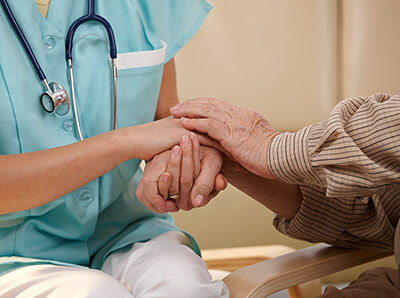
Providing Mental Health Care in a Nurturing Environment
The Auerbach Geriatric Psychiatry Unit (AGPU) at the Los Angeles Jewish Home is an innovative facility for short-term geriatric psychiatric care. This state-of-the-art inpatient facility incorporates the Jewish Home’s nationally acclaimed model of compassionate, high-quality care.
Comprehensive treatment is provided by specialized staff using an interdisciplinary team approach. The team includes board certified geropsychiatrists, other medical doctors, experienced psychiatric registered nurses (RN), social workers (LCSW), and certified nurse assistants (CNA) with training in mental health. Activity therapists and physical therapists round out the team.
AGPU admits individuals with a primary psychiatric diagnosis who are experiencing stressful mental or emotional challenges that require intensive, short-term care. The average length of stay is 10-14 days. Both voluntary and involuntary admissions are accepted. An involuntary admission occurs when a patient is gravely disabled or a danger to themselves or others. The California Mental Health Law (LPS Act) facilitates short-term admission for a 72-hour period of observation, evaluation, and treatment.
Behavioral health diagnoses treated at AGPU include depression, anxiety/panic disorders, bipolar disorder, delirium, Alzheimer’s dementia with behavioral disturbance, schizophrenia/psychotic disorders, impulse control disorders, and post-traumatic stress disorder. While the most common admitting diagnosis at AGPU is dementia, depression is the most common mental health issue among seniors overall.
When patients are admitted to the Auerbach Geriatric Psychiatry Unit, they are evaluated using psychosocial and medical assessments. A plan of treatment is determined and implemented by the interdisciplinary team, which meets weekly to review each patient’s progress and adjust treatment as necessary.
At AGPU, the focus is on reducing symptoms and treating the underlying condition in a calm, nurturing environment. Each person has a private room, which includes a bathroom. Individual and group therapies are offered and patients are encouraged to participate. Spiritual counseling is available and kosher meals are provided.
The Auerbach Geriatric Psychiatry Unit is located in the Joyce Eisenberg-Keefer Medical Center on the Home’s Grancell Village campus. It is Medicare certified and accredited by The Joint Commission. For more information regarding the Auerbach Geriatric Psychiatry Unit, please call 818-758-5041 or visit their web page by clicking here.
Feb
27

Inner Reflection on Purim
Everyone loves Purim because it is such a festive and joyful holiday, with costumes and homantaschen, megillah readings and silly shpiels, gift giving and tzedakah. It is almost uncanny that a book as irreverent as the Megillah of Ester was included in our Bible. The name of God is not even in the story!
The characters in the Megillah are very extreme, which is what makes the story both funny and entertaining: The King is a fool who can be manipulated by anyone, Mordecai is perfectly good, Ester is a gorgeous heroine and Haman is completely evil. And let us not forget Vashti—a feminist before her time, because she refused to dance with only her crown on in front of the King’s friends and courtiers.
But what if there is a Haman inside of each of us? My colleague Rabbi Amy Eilberg cites Rebbe Levi Yitzhak of Berditchev (18th century Ukraine) as he addresses this very question, saying: “Not only are Jews commanded to wipe out Amalek (who is the equivalent of Haman), but each Jew has to wipe out that negative part that is called Amalek in his or her heart. So long as the descendants of Amalek are in the world—and each of us is also a small world, when the power of evil arises in each of us, Amalek is still in the world, then the reminder, ‘to wipe out Amalek’ calls out from the Torah.”
Rebbe Yitzhak is referencing our most cruel persecutor in the Torah, Amalek, who was said to purposefully attack our ancestors from the back, thus harming the most vulnerable—the aged, the children, the disabled. Torah teaches us to “remember to blot out” the name of Amalek. Haman is seen as another manifestation of Amalek, as are all villians in history intent on destroying the Jewish People. That is why we shout “Boo!” when we hear his name.
Purim, then, takes on new depth, where we are not only prodded to fight against evil forces in politics and society but we are also reminded to confront the capacity for cruelty that we each have inside of ourselves.
But don’t panic! A willingness to admit that we may each have a bit of Haman inside of us is important, so that we are on the lookout to keep our worst impulses at bay and under control. But remember that we certainly have a Mordecai and an Ester and Vashti inside of us too. Sometimes we are utterly wise and courageous. There are moments when we feel deeply faithful and religious and hopefully most of the time we overflow with goodness and kindness.
Purim comes this year at the end of February and the beginning of March. Like so many other Jewish holidays, you can find it at the next full moon. As our people have done for millennia, let us rejoice in the survival of our people against those who have sought to harm us and be inspired to recognize, nurture and celebrate our inner Esters and Mordecais.
Happy Purim 2018!
Feb
19
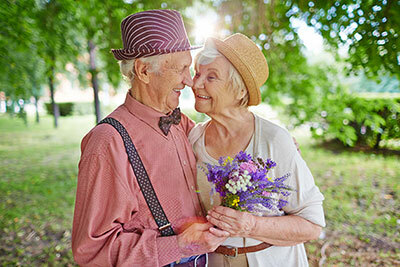
Love Is the Best Medicine
In 1984, Tina Turner asked the question "What's love got to do with it?" When it comes to your health, it turns out the answer is: quite a lot, regardless of your age! Better memory, stronger immune system, decreased risk of early death, lower cholesterol levels, and decreased pain levels are some of the benefits that can occur when you're in love. Remember falling in love and having butterflies in your stomach? That's your brain telling your heart to beat three times faster than normal, resulting in an increased blood supply throughout your body.
While the fountain of youth doesn't exist, love comes close. When you're in love, endorphins produced by the body increase blood flow to the skin, which helps keep it soft and smooth, and reduces the development of wrinkles. The increased supply of essential food and oxygen to skin cells also gives the face a pinker, healthier glow.
And, let's face it: Who doesn't love being in love? It just feels good. The emotional connection, the physical intimacy, the companionship…all can lead to improved physical and mental health.
What about physical intimacy among older adults: is it just holding hands and hugging, or is there more to it? According to a recent study, 54% of men and 31% of women over age 70 report they are still sexually active, with a third saying they have sex at least twice a month. The New England Journal of Medicine reports the majority of seniors who are married or have intimate partners remain sexually active well into their 80s.
Of course, as we age, our hearts may say "yes!" and our bodies may respond "wait a minute!" Often a lack of desire or inability to perform may slow things down. People of any age may feel hesitant about talking with their doctor about sexual issues. An open and honest discussion can often lead to solutions, which can result in a healthier and happier life, both physically and emotionally. Your physician can also address issues of safe sex, which many older adults may think only applies to younger people.
So, whether it's an emotional connection, companionship, a feeling of togetherness, or physical intimacy, if it feels good, do it! Your mind and body will thank you for it!
Feb
15
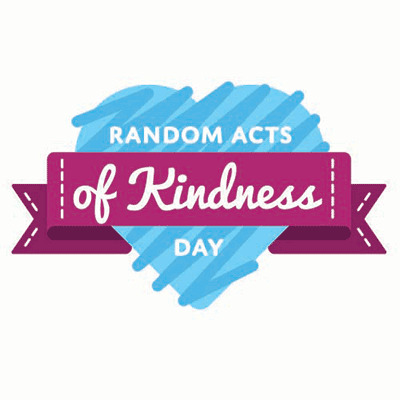
21 Ways to Celebrate Random Acts of Kindness Day!
Saturday, February 17th, is Random Acts of Kindness Day. It's a day that has grown in popularity over the years. And for good reason: being kind feels good.
Here are 21 random acts of kindness you can do:
Stop at a child's lemonade stand and buy a drink.Surprise a neighbor with freshly baked cookies or treats!Getting a coffee? Buy one for the person behind you in line.Help a pedestrian safely cross the street.We all know parents who need a night out. Offer to babysit for free.Hold the elevator door open for someone in a hurry.Purchase extra dog or cat food and bring it to an animal shelter.When you're at the supermarket, let someone with just a few items go ahead of you.Give a friend or family a plant or flowers.Have a clean-up party at a beach or park.Leave your waiter or waitress a generous tip for good service.Write your partner a list of things you love about him or her.Run an errand for a busy friend or family member.Email or write a person who made a positive difference in your life.Let another car merge in front of you.Offer to give directions to someone who looks lost.When you're at the grocery store, help people return their shopping carts.Bring food or snacks for the people you work with.Make sure every person in a group conversation feels included.When you're with family and friends, focus on them instead of your cell phone.Become an organ donor.
There are so many other potential random acts of kindness. Do whatever you can—on February 17th and every day!
Feb
7
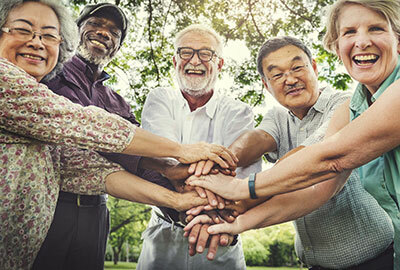
8 Reasons Why Friendships Are So Important
Multiple studies have proven that having close friends is good for your health and well-being. Here are eight reasons why making and keeping friends is so beneficial.
Friends make you—and others—happy. Happiness is contagious! A heart study demonstrated that people have a tendency to gather into happy or unhappy groups, and happiness appears to spread to those immediately inside the group and to people outside the group as well.Friends help boost your immune system. Being socially active produces positive emotions, which may boost your body's immune system and reduce stress.Good friends are great listeners. Sometimes, you just want to get something off your chest. Who better to rant and rave to than a friend? Good friends listen but don't judge.Friends are honest. Being a good friend means that you are supportive, but also honest. Hard as it may be, friends can help you face the truth.Friends help you cope with grief. People who receive support from friends or family after a personal loss are better able to cope with their grief. The most effective forms of support are often the simplest: listening, offering sympathy and encouragement, and just being physically present. In contrast, feeling alone tends to worsen grief.Friends help you meet your fitness goals. Friends provide the encouragement and support you need to achieve your fitness goals, such as losing weight, quitting smoking, or eating a healthier diet.Friends give you self-confidence. We may doubt our decisions and abilities. Good friends stand by you and help you believe in yourself.Friends help you age more gracefully. A survey of people over age 60 shows that those who have close, healthy relationships with family and friends are more content as they grow older.
Spending time with friends is fun; it may also produce long-term physical and emotional health benefits. So keep your friends and make new ones. You can never have too many.